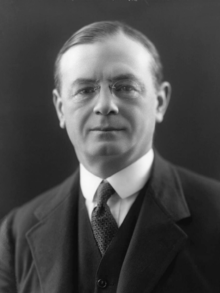
Back ليو أميري Arabic ليو اميرى ARZ Leo Amery Czech Leo Amery Welsh Leopold Stennett Amery German Leo Amery Spanish Leo Amery French ליאופולד איימרי HE Leo Amery ID Leo Amery Italian
This article needs additional citations for verification. (January 2021) |
Leo Amery | |
|---|---|
 | |
| First Lord of the Admiralty | |
| In office 31 October 1922 – 28 January 1924 | |
| Monarch | George V |
| Prime Minister | |
| Preceded by | The Lord Lee of Fareham |
| Succeeded by | The Lord Chelmsford |
| Secretary of State for the Colonies | |
| In office 6 November 1924 – 4 June 1929 | |
| Monarch | George V |
| Prime Minister | Stanley Baldwin |
| Preceded by | J. H. Thomas |
| Succeeded by | The Lord Passfield |
| Secretary of State for India and Burma | |
| In office 13 May 1940 – 26 July 1945 | |
| Monarch | George VI |
| Prime Minister | Winston Churchill |
| Preceded by | The Lord Zetland |
| Succeeded by | The Lord Pethick-Lawrence |
| Personal details | |
| Born | Leopold Charles Maurice Stennett Amery 22 November 1873 Gorakhpur, North-Western Provinces, British India |
| Died | 16 September 1955 (aged 81) London, England |
| Political party | Conservative |
| Children | Julian, Baron Amery John Amery |
| Education | Harrow School |
| Alma mater | |
| Occupation | Politician and journalist |
Leopold Charles Maurice[1] Stennett Amery (22 November 1873 – 16 September 1955), also known as L. S. Amery, was a British Conservative Party politician and journalist. During his career, he was known for his interest in military preparedness, British India and the British Empire and for his opposition to appeasement. He was Secretary of State for the Colonies (1924-29), opposed the National Government of the 1930s and served as Secretary of State for India during the Second World War (1940-45). He was also a prolific writer whose output included a multi-volume history of the Second Boer War and several volumes of memoirs and (posthumously published) diaries.
Nowadays he is best remembered for the remarks he made in the House of Commons on 7 May 1940 during the Norway Debate, attacking the Prime Minister, Neville Chamberlain, for incompetence in the fight against Hitler's Germany. Many of Amery's Parliamentary contemporaries pointed to this speech as one of the key drivers in the division of the House on the following day, 8 May, which led to Chamberlain being forced to resign and his replacement by Winston Churchill.
- ^ At some stage in his youth, Amery began using the name Maurice in place of his previous name Moritz. He did this so consistently that almost all sources give his name as Maurice. Rubinstein, p. 181.